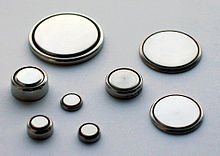
Hopefully, not your kids, especially if the button in question is a battery.
Button batteries, also know as coin cells, are designed to power small portable electronic devices, such as hearing aids, pocket-sized calculators, wrist watches and handheld video games. However, for some young children the smooth and shiny batteries are also the perfect fit for their mouths.
In fact, so many children have attempted to “taste” the tiny batteries that the Centers for Disease Control and Prevention just published a report warning parents about battery-related dangers. The CDC’s report states that from 1997 through 2010, nearly 30,000 children ages 7 months to 3 years old were rushed to the hospital for battery-related injuries, with more than half of the cases involving button batteries. Sadly, 14 deaths resulted from those incidents.
“Parents and caregivers should be aware of the potential hazards associated with battery exposure (particularly ingestion of button batteries), and ensure that products containing them are either kept away from children or that the batteries are secured safely in the product,” the CDC wrote in its report.
Some of the injuries caused by kids swallowing button batteries include chemical burns, hemorrhaging and tears in the esophagus. Symptoms associated with battery consumption range from low-grade fevers to abdominal pain and difficulty breathing.
Unfortunately, those symptoms could be indicative of a myriad of other health problems. The CDC’s report featured one case in which a 2-year-old boy was released from an emergency room after being treated for choking, only to return a week later when he died of hemorrhaging. Doctors failed to properly diagnose the toddler and his parents didn’t know he had swallowed a button battery, so they weren’t able to provide vital information to hospital staff. In other cases where children died from swallowing the tiny batteries, they had initially been treated for viral infections, strep throat, and croup.
Unless you witness your kid swallow a battery, diagnosing the problem can be challenging, which is why the CDC is urging you to keep the disk-shaped objects far away from curious children.
Related Articles:
Driving the Family Germ-mobile
Has Becoming a Parent Made You a Better Person?

